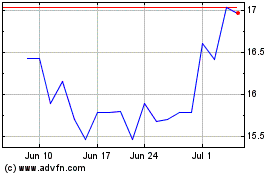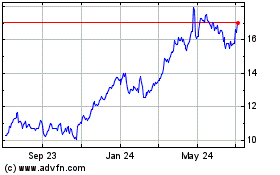By Jenny Strasburg
Deutsche Bank AG stumbled on a mix of Brexit-induced uncertainty
and snags in its own turnaround plans last quarter, accentuating
the image of European banks as global laggards.
The German lender said its net income for the three months
ending in June fell 98% from a year earlier, hurt by low interest
rates, restructuring costs and weaker performances by its big
trading and investment-banking operations.
The German lender said net income fell to EUR20 million ($22
million) from EUR818 million a year earlier, while net revenue
dropped 20% to EUR7.4 billion. The bank beat average net-income
forecasts of analysts, but those expectations had been lowered
since the June 23 U.K. vote to leave the European Union, and were
wide-ranging. Analysts had forecast anywhere from a quarterly loss
of more than EUR1 billion to a profit of more than EUR500
million.
Deutsche Bank shares traded down more than 4% after earnings
were reported. They ended the day down 3%.
Chief Executive John Cryan told analysts that the German bank
must do more to control costs and warned of "more ambitious" steps
if market conditions remain difficult.
The results from Europe's most globally prominent investment
bank highlighted the sharp divide between European and U.S. banks.
Deutsche Bank executives emphasized how much harder hit the German
lender was by Europe's wobbly economy and political uncertainty, in
contrast to big U.S. banks that benefited from their more resilient
home market.
At Deutsche Bank, second-quarter sales-and-trading revenue fell
23% from a year ago. That compared to an average 10% gain in
trading revenue at big U.S. banks that reported earnings last week,
led by J.P. Morgan Chase & Co. and Citigroup Inc.
Mr. Cryan told analysts Wednesday that banking customers will
increasingly feel the impact of negative or near-zero rates. "We
don't think that banks will just sit there and absorb the costs
themselves," Mr. Cryan said on a conference call. He a multiyear
turnaroundsaid banks will likely increase fees and take other
measures to pass on the pain.
European banks are suffering disproportionately from low
interest rates, a fundamental symptom of Europe's economic
woes.
Mr. Cryan said Deutsche Bank was making progress in a multiyear
turnaround, but warned that if weak market conditions persist, it
"will need to be yet more ambitious in the timing and intensity of
our restructuring."
Deutsche Bank's shares have dropped 45% this year, compared with
a 27% decline on the Stoxx Europe 600 banks index. Investors have
sold European bank shares since the U.K. voted to leave the EU.
The Frankfurt-based bank has been hit harder than most. It is
cutting costs and clients and selling assets to satisfy new,
more-stringent capital requirements over the next three years. It
has further to go to meet those requirements than many peers
do.
Deutsche Bank's turnaround strategy has eaten into trading and
investment-banking revenue. Persistent concerns about the adequacy
of its capital cushion have weighed on shares, but executives have
said that issuing new shares isn't in their plans.
At the same time, Deutsche Bank's planned divestiture of its
Postbank retail-banking unit in Germany has been delayed by market
conditions. Executives said Wednesday they can afford to wait it
out, but analysts have questioned whether a public offering or sale
becomes less viable as time passes.
The bank also has been trying to settle regulatory
investigations it expects will result in big fines, as well as
civil lawsuits, another uncertainty for investors. Executives said
Wednesday that they are still hopeful the bank will settle the
biggest regulatory investigations this year. The bank said in its
half-year report that it has started talks with the U.S. Department
of Justice to resolve claims related to mortgage-backed securities,
one of the two biggest-ticket legal items the bank faces.
Low interest rates and economic uncertainty stemming from Brexit
weighed on the lender's biggest businesses last quarter. Revenue
fell year-over-year in all four of Deutsche Bank's business
divisions, including asset management.
The worst year-over-year revenue decline was in global markets,
the bank's sprawling securities-trading operation and its biggest
unit by revenue. That division's second-quarter revenue declined
28% from the year-earlier period, to $2.4 billion. Within the
business, overall sales and trading revenue fell 23% during the
quarter from a year earlier. Debt-trading declines were an outsize
drag on performance, because fixed-income products account for a
far bigger chunk of the trading business.
The lender said some of the declines were rooted in previously
announced decisions to shrink Deutsche Bank's global footprint.
Expenses related to job cuts also weighed on results. So did a
decision to transfer some assets into the global markets business
from asset management, where Deutsche Bank said they didn't
fit.
Lower compensation in the trading business helped results,
Deutsche Bank said. Investors have questioned whether the business,
historically a main profit driver, has been losing too much talent,
but Marcus Schenck, the bank's finance chief, said there was
"nothing abnormal" in staff attrition rates in the unit.
Investment-banking revenue was down 12% from a year ago, to $1.9
billion, after suffering from what Mr. Cryan called "paralyzed
markets" in Europe.
Deutsche Bank's common equity Tier 1 ratio, a key measure of
high-quality capital, improved slightly from the first quarter, to
10.8% as of June 30, but the ratio is still down from its year-ago
level of 11.4%.
Write to Jenny Strasburg at jenny.strasburg@wsj.com
(END) Dow Jones Newswires
July 27, 2016 12:32 ET (16:32 GMT)
Copyright (c) 2016 Dow Jones & Company, Inc.
Deutsche Bank Aktiengese... (NYSE:DB)
Historical Stock Chart
From Mar 2024 to Apr 2024

Deutsche Bank Aktiengese... (NYSE:DB)
Historical Stock Chart
From Apr 2023 to Apr 2024
